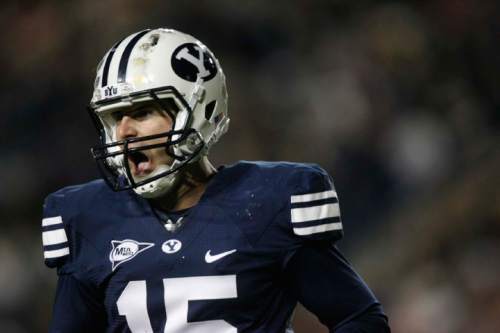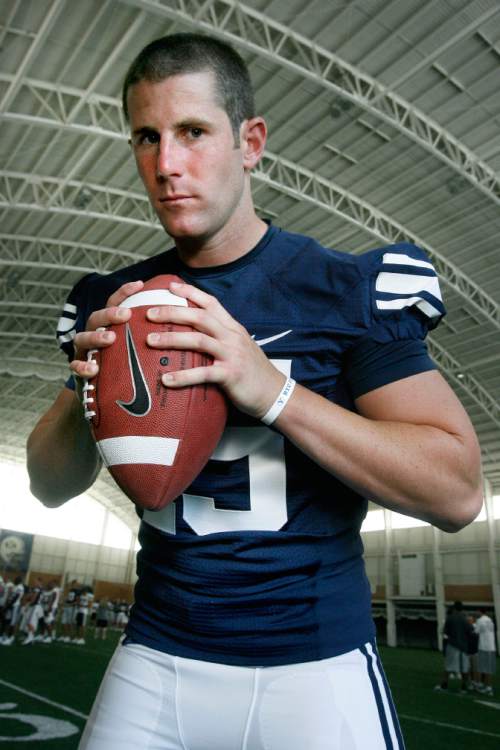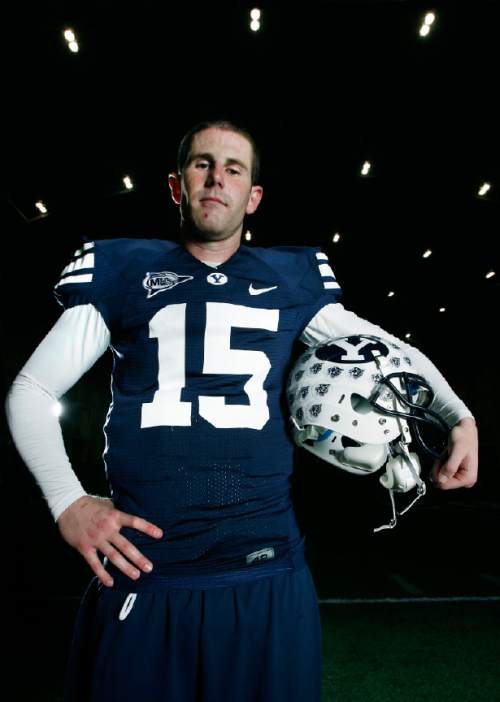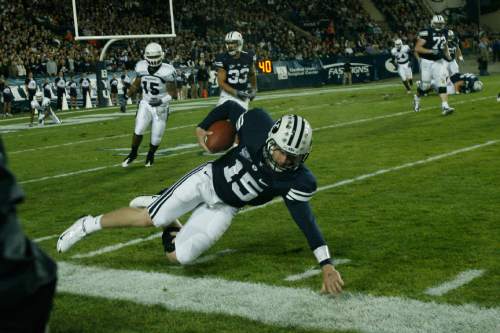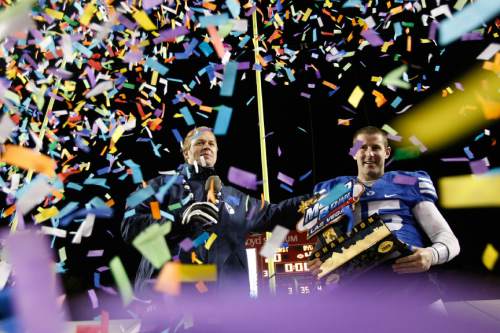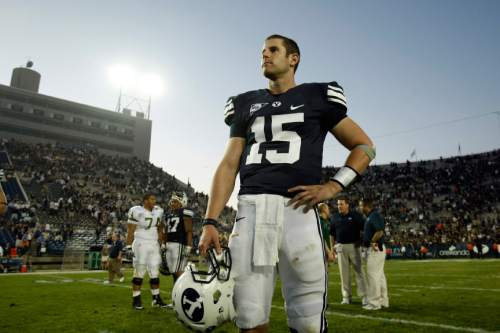This is an archived article that was published on sltrib.com in 2016, and information in the article may be outdated. It is provided only for personal research purposes and may not be reprinted.
The worst of it for Max Hall didn't come on the day he was arrested, wearing a BYU T-shirt, in a Best Buy store for shoplifting and possessing cocaine and drug paraphernalia. He was in a fog when that happened, addled and confused as he was taken into police custody and later released.
"I don't remember much about any of that, other than sitting in a police car," he said during consecutive interviews on 1280 The Zone and for The Tribune on Monday. "It kind of threw me for a loop. … I was out of it."
He told police he had used cocaine earlier in the day.
The real depths came in solitary suffering over the next 36 hours, after he returned home, not knowing what to do next, exactly how to tell his wife, McKinzi, and other family members what they may have already suspected — that he was a man in the throes of potentially deadly decline.
He also knew his path would become a public deal — and that was a double-barreled blast of embarrassing and humiliating. He thought people would laugh at him.
"That was the lowest point of my life," Hall said. "… Now, I can look at it as a blessing because my secret was out, everybody knew and it was time for me to get help. It was the big man upstairs slapping me in the face and, saying: 'OK, your time is up. It's time for you to take care of business and do what you have to do.' I knew it would be hard and I'd have to face a lot of tough situations."
He no longer was the daring and dauntless starting quarterback at BYU, no longer the strong-minded starter for the Arizona Cardinals, no longer even a scrub for a Canadian league team, an outfit that had released him. He was a closet drug addict, an alcoholic crumbling under the weight of his own skin, a former football player who during his playing days had found relief from concussions and shoulder surgeries and the awful resultant pain with the assist of Oxycontin and cocaine and alcohol.
It got bad during his rookie season with the Cardinals, in 2010, and worsened in 2011. From there, he alternately cleaned up and got dirty over the span of three years, never quite able to defeat the draw of the drugs, even after playing in the games was done and gone.
"It put my life in a downward spiral," he said. "It was tough. … I got caught up in it bad."
Over a six-month period, Hall finally thought he'd hacked his way free. He wanted to believe he'd beaten it — "You think you can handle it," he said — all on his own, particularly the abuse of the Oxycontin, a painkiller that he said did more than kill his pain, it gave him "the best high in the world." Turned out, it took more than it gave. He called it the devil, a drug meant to kill pain that ironically so horribly enhanced it, instead.
His life became a hellish mess. Still, he refused to get help.
"I was scared," he said.
But the painkiller continued to pull hard.
"The cravings you have for it, I can't describe how nasty that is," he said.
While working as the offensive coordinator at Gilbert [Arizona] High School, Hall was found shoplifting, the illegal drug and gear in tow, and arrested on Saturday, Aug. 30, 2014. On Sunday, Aug. 31, the enormity of his errors, after years of rationalizing the deceit and deception, crashed in on him, as he put it, "forcing me to get help." That absolute nadir came on Monday, Sept. 1, when he finally started to understand the breadth and depth of his own helplessness.
"It hit me," he said. "I thought, 'I'm tired of this s—-. It's ruining my life.' I thought my wife [and two young kids] might leave me. That's when I realized I had to do whatever it took to get this done. But it was different than sports. You can't just get mad and will yourself to do it. That worked for me in football. But, with this, you need more than mental toughness.
"The hardest thing for me was, for the first time in my life, I had to be transparent, I had to be open and honest, I had to be humble. I had to dig deep and ask for help. I was powerless. I couldn't beat this thing on my own. I needed help. My wife and family supported me. The support [from friends] has been overwhelming. Humility is a big, big thing. I've been blessed to rise up out of that and get my life back in order."
He added: "Chasing a pill or chasing a drink is a crappy way to live your life."
After three months of rehab following his arrest, Hall has existed since approaching the breaths of each day delicately, seeking the aid and discipline necessary to stay clear of the traps of his past. He said he does that, in part, by speaking to groups, helping others who fight similar battles:
"There are a lot of people out there who struggle with addiction. It's something that really needs to be taken seriously. A lot of people need help with it, and I'm trying to do everything I can to give back and to help others."
Initially, Hall fell into deep despair, but later found encouragement to climb out, and keep climbing.
"Your thoughts are so negative," he said. "You think people are going to hate you, that people won't want to have anything to do with you anymore, that people will think you're a hypocrite. You're going to get judged for the situation that you're in. There are some people who did that. But, for the most part, 90 percent of the people out there, to my surprise, were supportive, loving and caring, willing to do anything to help me get back on my feet …"
He paused.
"… Even Utah fans."
So, Max Hall hates no one now, just a thing — drug addiction. He goes on living his life, step by small step, looking to leave the hurt and destruction of his past behind him, while concurrently remembering what it is he has to avoid.
"It is day to day," he said. "There are little things I need to do every day to keep my mind and myself focused on sobriety — a few readings I do every day, attending AA meetings, seeing a counselor, and being very involved in my church, and my relationship with God. Those are the things I'm focusing on. I'm lucky to be sober today, but tomorrow I could have a bad day and slip up. And it can happen that fast. I take it seriously and just do everything I need to do to stay sober."
GORDON MONSON hosts "The Big Show" with Spence Checketts weekdays from 3-7 p.m. on 97.5 FM and 1280 AM The Zone. Twitter: @GordonMonson.


